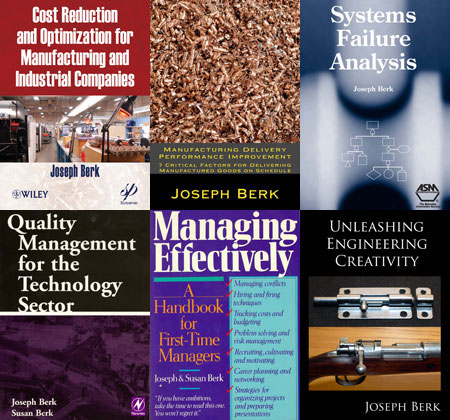|
|
Manufacturing Leadership Training This course helps manufacturing lead personnel, supervisors, managers, manufacturing engineers, QA personnel, and schedulers develop their leadership and supervisory skills. The course addresses the unique challenges inherent to a manufacturing organization. The Manufacturing Leadership program is intense, it is based on real-world manufacturing management experience, and it is focused on results. Manufacturing Leadership is a comprehensive and intensive training program that presents the essential elements of an effective and proactive manufacturing management system, with a special focus on developing strong first-level manufacturing management teams.Topics include lead person, supervisor, and executive manager roles in the manufacturing environment, and how these key positions influence quality, cost, and delivery performance. This is a practical course taught from the perspective of an experienced manufacturing manager, with a special emphasis on real-world solutions, the nuts and bolts of manufacturing leadership, and delivering conforming products on schedule.The course develops and presents a results-oriented roadmap for implementing an effective manufacturing management system. You will learn how to:
Course Outline Session 1: Introduction. Course content.Historical manufacturing perspectives.Manufacturing enterprises. Organizational approaches. Organizational cultures. Session 2: Leadership. Leadership. Leadership traits and styles. Characteristics of a good leader. Situational leadership. Supervision versus management. Executive management. Responsibilities versus organizational position. Session 3: Theories of Motivation. Hunsaker-Allesandra personality styles. Maslow's hierarchy of needs. The power/achievement/affiliation motivation model. Identifying individual motivational factors. Motivators and demotivators. Group activity. Session 4: First-Level Supervision. Lead responsibilities and authority. Supervisor responsibilities and authority. Maintaining the supervisor/subordinate relationship. Selecting leads and supervisors. Coaching leads and supervisors. Role of the lead and supervisor in shaping the culture. Group activity. Session 5: Building a Manufacturing Team. Team development. Elements of a successful team. Building trust. Cross training. Competition. Group activity. Session 6: Work Assignment. The production control challenge. Planning, scheduling, and priorities. Matching individuals to work requirements. Basic MRP/ERP operating systems. MRP/ERP dispatch lists and transactions. Lead and supervisor work assignment responsibilities. Improvement opportunities. Group activity. Session 7: Manufacturing Standards. Standards definition. Developing standards. Standards accuracy issues. Standards updating. Making standards effective. Communicating standards. Lead and supervisor standards responsibility. Group activity. Session 8: Measuring and Improving Productivity. Productivity definition. Utilization definition. Productivity and utilization challenges. Identifying productivity and utilization detractors. Delay ratio analysis. Efficiency evaluation. Recognizing and rewarding superior productivity. Lead and supervisor productivity responsibility. Group activity. xc Session 9: Assessing Capacity and Load. Capacity and load definition. Using standards for load determination. Comparing capacity versus load.Theory of constraints. Identifying and resolving production bottlenecks.Lead and supervisor capacity and load assessment responsibility.Improvement opportunities. Group activity. Session 10: Overtime. Overtime definition. Overtime assignment and authority. Overtime budgets and budget monitoring. Assessing overtime effectiveness. Lead and supervisor overtime responsibilities. Group activity. Session 11: Quality. Quality definition. Quality responsibility. Prevention versus detection. The inspection function. Lead and supervisor quality responsibilities. Quality measurement and reporting. Session 12: Problem Solving. Identifying problems. The 4-step problem solving process. Identifying all potential causes. Converging on most-likely causes. Corrective action identification and implementation. Lead and supervisor problem solving responsibilities. Knowing when to call for help. Group activity. Session13: Conflict Management. The nature of conflict. Identifying and understanding conflict. Positive and negative aspects of competition. Resolving conflict. Lead and supervisorconflict resolution responsibilities. Group activity. Session 14: Training. Job-specific success factors. Recognizing training needs. Training newly-assigned personnel. Refresher training. Manufacturing instructions. Lead and supervisor training responsibilities. Group activity. Session 15: Work Center Organization. Work center definition. Work flow. Lean manufacturing concepts. Cellular manufacturing. Work center cleanliness. 5S and Mr. Clean programs. Lead and supervisor responsibilities. Group activity. Session 16: Visual Manufacturing and Communications. Productivity metrics. On-time delivery metrics. Overtime metrics. Utilization metrics. Schedule/MRP compliance metrics. Metrics posting. Lead and supervisor responsibilities. Group activity. Session 17: Interviewing. Interview purposes. Interview questions. Interview preparation. Overcoming interviewee reluctance. Selling the organization. Group activity. Session 18: Time Management. Personal time management. Lead, supervisor, and manager time management considerations. Keeping a personal schedule. Prioritizing. Session19: Meetings. Meeting purposes. Meeting logistics. Minimizing meetings. Agendas. Meeting follow-up. Supervisor responsibilities. Improvement opportunities. Session 20: Counseling. Assessing work from quality and productivity perspectives. Providing feedback. Eliminating blame, fear, and intimidation. Recognizing and rewarding superior performance. Knowing when to ask for help. Lead and supervisor responsibilities. Improvement opportunities. Session 21: Staying on Schedule. Delinquent delivery root causes. Process yield. Productivity. Supplier performance. Purchasing. Planning. Organization. A delivery performance improvement roadmap. Session 22: Course Wrap-Up. Course review. Developing a follow-on action plan. Course evaluation. Customize It
How You Will Learn
Our Expertise We are experts in manufacturing leadership. We've walked the walk, having personally managed plants and plant turnarounds. We know from personal experience how to improve quality, lower costs, meet demanding delivery schedules, and manage factories. We've done so in the aerospace, defense, biomedical, water treatment, precision machining, injection molding, electronics, recreational vehicle, motorcycle, and many other industries.
There's no fluff here. We know our business, we are widely published in these areas, and we can provide laser-like focus on identifying improvement opportunities and implementing meaningful change. We can help your team attain these same skills! The above training can be customized to meet your requirements. Please call us at 909 204 9984 or contact us via email. |
|
|
We've been all over the world helping manufacturers improve. Take a look at just some of the great local sights we get to see! |
